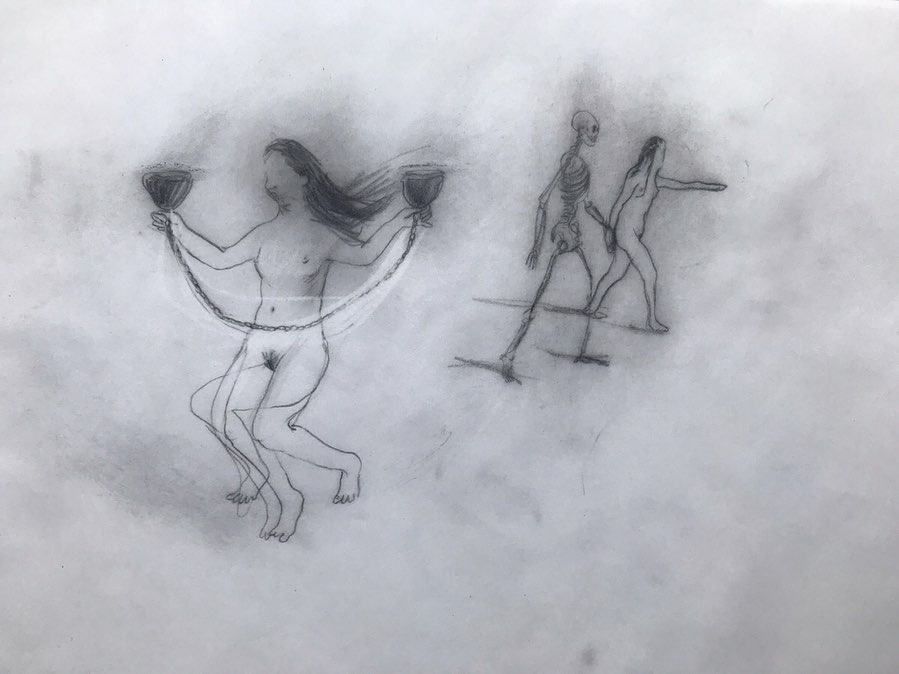
TZVETNIK: Cold Prey <----
“She and the other people, both being betrayed. Almost without being aware of it, she was cushioning deeper and deeper into the rock. She buried herself, out of sight of the stars, out of touch with the wind, unaware of the world. She was pure thought. [...]
It was remarkable how clearly she could think. Remarkable. There was fierce enjoyment in this, that she would use reason to overcome the cruel reasoners. They wouldn't be able to stop her, for she could go where no Hard One could go, where no Rational or Parental could—and where no other Emotional would.
She might be caught eventually, but at the moment she didn't care. She was going to fight to have her way—at any price—at any price—though to do it meant she would have to go through rock, live in rock, skirt the Hard-caverns, steal food from their stored energy batteries when she had to, flock with the other Emotionals and feed on Sunlight when she could. But in the end she would teach them all a lesson and after that they could do as they wished. She would even be ready to pass on then—but only then—”
-The Gods Themselves, Isaac Asimov
A cellar is typically used for storage — for holding unused things until they are needed later, or for hiding things which are unwanted. Objects absist (they neither exist nor cease to exist) in a state of suspension, still imprinted by their function within capital, but not expressing their use-value. Objects in a cellar space are static within this indefinite condition of utility; they are strangely liberated by this, too.
Without speculation upon an object’s continual productivity or legibility, it can decompose and sustain communities of bacteria and fungi, and disappear from its primordial form altogether. Here, rot is the ecstatic final form of an object which has ceased to comply with its design. Otherwise, it might remain lacquered an idealized in the face of time, waiting to realize a purpose until, perhaps, it is culled. But without the intrusion of human senses or will, an object’s life is determined by its own gravity and composition. Under conditions of neglect or crisis, dormant power emerges. Darkness and other obfuscations magnify that unnamable, internal thing that urges us to survive.
A friend told me “I have died so many times” speaking of an accumulation of traumas, in recognition that perhaps a person is an archive of collapses and reconfigurations. I dreamt once that I couldn’t speak because I was cultivating a large pearl under my tongue. When it was ready, I marveled at my body’s ability to produce this compression. Pearls are formed as an immune response by bivalves, against parasites or attacks which injure their soft inner tissue. An intrusive particle is entombed by nacre, a lustrous secretion which lines the bivalve’s inner shell, and this secretion is deposited continually for as long as the organism lives. I think of my friend as a pearl: glimmering and hardened, formed in response to vulnerability, forever vigilant against a memory. An unseen pathogen remains at the core.
Perhaps survival mechanisms are learned when an encoding that was always present is coaxed out from a callow space by inescapable shock. But then, coping with the past demands a parsing out of personal fictions which once served our survival. Through this incongruity, materials, images, and language dually contain the memory of their former inactive state, and their new, frenetic potentiality. The ground strewn with debris of activity—ribbons, rings, shards of glass and swatches of clothes—form a forest floor, forgotten but fertile.
Cold Prey
with Mercedes Azpilicueta, Julian-Jakob Kneer, Luna Ghisetti, Zhang, TARWUK, Bryce Kroll, Madeleine Jorn, Youri Johnson, ASMA, Daniel Baird, Masha Kovtun, Santiago Licata, evA l'avasseur
Curated by Underground Flower with support from Francisco Correa Cordero
Performances and closing installation by the Catabasis Exaltation Liberation Front, directed by Lilumnia and Torre
Photos by Plenilunix and Francisco Correa Cordero
Texts by Persephone, Madeleine Jorn, Lilumnia, and the CELF
Poster design by Leyli Aslanova